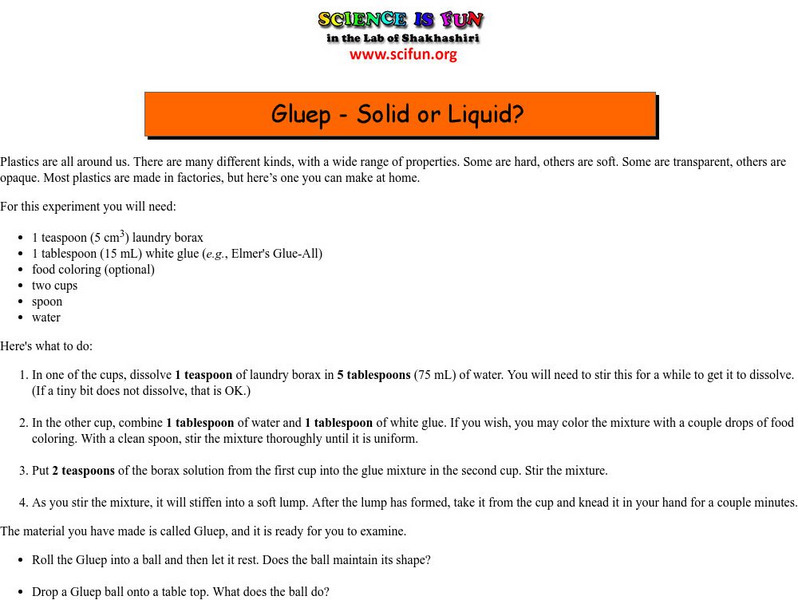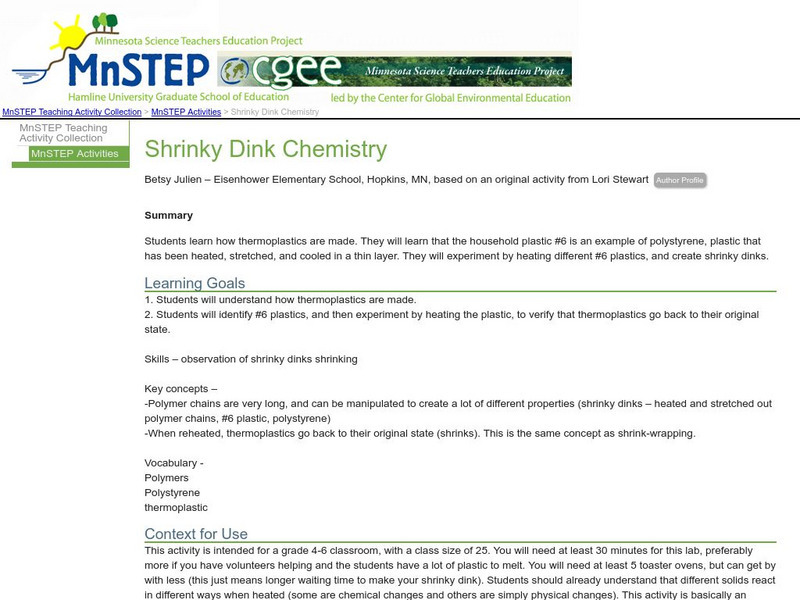Other
American Chemistry Council: History of Polymer and Plastics for Students
This resource presents a brief guide introduces the history, structure, and characteristics of plastics and polymers.
TeachEngineering
Teach Engineering: Bridging to Polymers: Thermoset Lab
Students act as engineers to learn about the strengths of various epoxy-amine mixtures, and observe the unique characteristics of different mixtures of epoxies and hardeners. Student groups make and optimize thermosets by combining two...
Other
American Chemistry Council: Plastics: Basics: Polymer Definition and Properties
This resource provides information about what polymers are and their properties.
Science Education Resource Center at Carleton College
Serc: Plastic Polymers: Investigating Their Flexibility
Students will use their prior knowledge about changes of matter to develop a hypothesis to test the physical properties of materials such as plastic (polymers) and how its chemical properties allow it to have unique physical properties.
Math Science Nucleus
Math/science Nucleus: Polymer Storybook
This animation discusses polymers and the properties of polymers in a storybook format. The story covers polymers both plastic and natural, and provides interesting information.
Other
American Plastics Council: The History of Plastics
This site from the American Plastics Council provides a brief history of all major developments of fibers and plastics including the early invention of rayon. Very interesting and informative, it also includes a timeline for easier...
McREL International
Mc Rel: Glue Polymer (Whelmer #15 Learning Activity)
An easy to do activity that investigates the basic principles behind chemical bonding. The activity is written in lesson plan format that meets NSES standards.
Science is Fun
Science Is Fun: Gluep Solid or Liquid?
In this experiment, students create a polymer substance called Gluep, then investigate its properties. Includes a detailed explanation of how the polymer molecules bond together to form the plastic.
Science Education Resource Center at Carleton College
Serc: Mn Step: Shrinky Dink Chemistry
In this lesson, students first learn about thermoplastics, and about polystyrene in particular, which is a #6 plastic. They will then heat different #6 plastics to create shrinky dinks. As they are heated, they shrink, which is a...
Massachusetts Institute of Technology
Mit: Inventor of the Week: Leo Baekeland
Use this site to learn about how Leo Baekeland invented plastic, and how this simple invention resulted in a "plastic revolution."
Other
Libros Vivos: Los Plasticos
Plastics are obtained by polymerization of compounds derived from petroleum and natural gas. Learn about the different plastics and about the different process of fabrication in this site. You will find a lot of illustrations and...
Science Struck
Science Struck: Ldpe Plastic
LDPE stands for low-density polyethylene. This resource describes its structure, physical and chemical properties, resistance to various chemicals, advantages and disadvantages, uses, its BPA-free status, and the issue of recycling LDPE...
American Chemical Society
American Chemical Society: The Bakelizer [Pdf]
Find out all you want to know about the revolutionary development of Bakelite, the first plastic created entirely from chemicals. Included is a biography of the inventor of Bakelite, Leo Baekeland.
Other
Chemical Heritage Foundation: Leo Hendrik Baekeland
Leo Hendrik Baekeland was the inventor of bakelite, the first completely synthetic plastic. Biographical information and photographs on this page.
Other
San Diego Plastics, Inc.: Polyethylene
The features, applications, and the fabrication process of high density and low density polyethylenes are listed and described.
York University
Chemistry Hall of Fame: Polyethylene a Plastic of Many Uses
Background information on the discovery of polyethylene is found on this website. Also lists polyethylene's many uses.
Other
Prince Edward Island: Behind the Eight Ball
Interesting historical article about the driving force behind the invention of celluloid.
Wikimedia
Wikipedia: Polypropylene
This site from Wikipedia, the free encyclopedia, provides brief but factual information on the function of Polypropylene. A good site to get a short overview on the subject, with a few links to additional information.
Curated OER
Smithsonian Institution Archives: Jeanne Helen Osiecki (B. 1926)
A native of Switzerland, organic chemist Jeanne Helen Osiecki (b. 1926) had received her Ph.D. from Stanford University in 1960 and began working at Lockheed Missiles and Space Co. in 1961. When this photograph was distributed, Osiecki...













![American Chemical Society: The Bakelizer [Pdf] Handout American Chemical Society: The Bakelizer [Pdf] Handout](http://content.lessonplanet.com/resources/thumbnails/456091/large/bwluav9tywdpy2symdizmdeyny0xmte3mdk4lwcwy3uxni5qcgc.jpg?1674856933)




